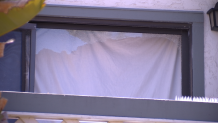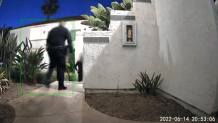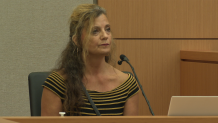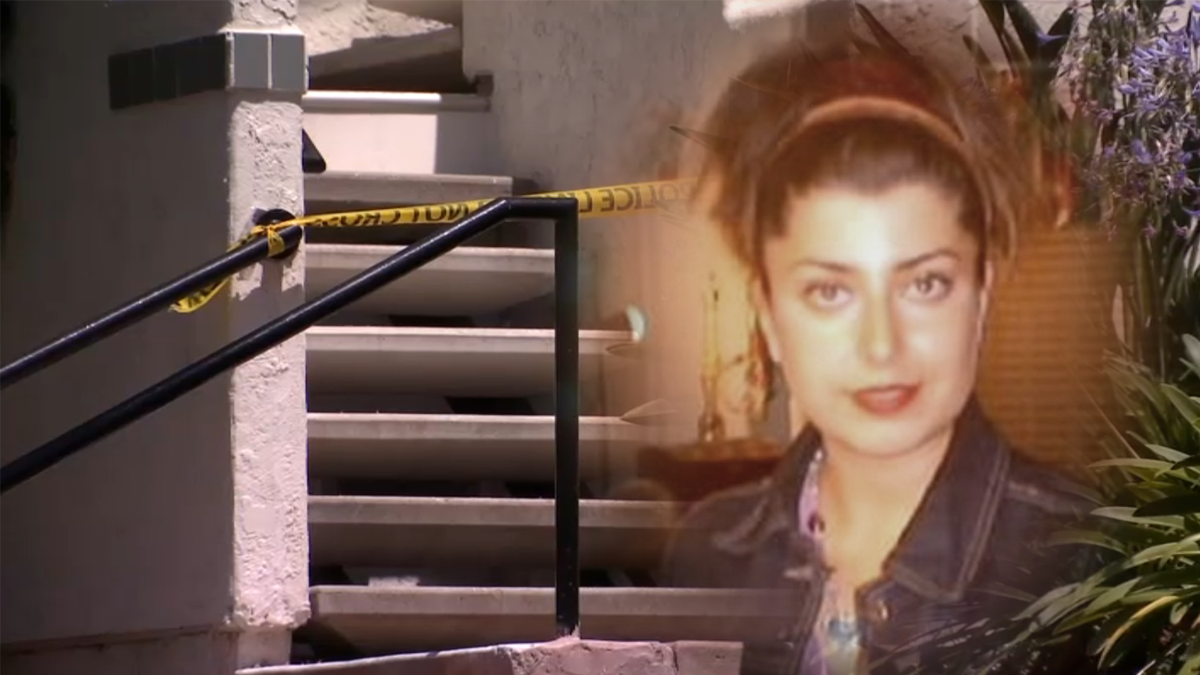Witness testimony on day two of the Rancho Peñasquitos murder trial delved deeply into the scrutiny of the San Diego Police Department’s emergency response. A neighbor told the court about how upset she was the night prosecutors say Parrish Chambers smashed his way into Connie Dadkhah’s condo through her second-story balcony sliding glass door and then beat her death.
“He was banging on the sliding glass door very loudly, and I saw it shatter, and I saw him go through that door,” the neighbor said.
That neighbor called 911 three times on June 14, 2022 — first to report the break-in at 8:03 p.m., and then again 38 minutes later to ask why police hadn’t shown up.
“They were taking quite a bit of time to get there, and I was worried that he could get into our apartment and harm us,” she testified.
The two 911 calls were played for the court. The dispatcher is heard telling that neighbor they’d received other calls about Chambers and units were nearby. When officers arrived at the complex around 8:47 p.m., they left 15 minutes later, after they couldn’t make contact with Dadkhah.
"They were just watching the unit, looking with their flash lights,” the neighbor testified. “They didn’t do anything.”
The neighbor called police one final time that night at 11:36 p.m., wanting an explanation about why officers chose not to enter the apartment to make an arrest or check to see if her female neighbor was safe. She wanted police to come back out.
The operator told her that police needed probable cause or a warrant to go inside. They also revealed that police were familiar with that man because they’d been called out to the condo several times before. They said they had reason to believe he lived there and may have just locked himself out of his unit.
The next morning, that neighbor was there when police arrived in greater numbers to investigate Dadkhah's death.
Click here to read up what happened during the other days of the murder trial. You can also watch replays of each day's proceedings the weekday after they happen, starting at 11:30 a.m.
Background on the murder case

On that morning of June 15, 2022, prosecutors say Chambers emerged from Dadkhah's condo, spattered with her blood. They say he flagged down a neighbor to call 911 to report that she was dead inside. He was taken into custody soon after and charged with her murder. He’s pleaded not guilty.
Police dispatch records show around 7 p.m. the night before, Dadkhah's neighbors began calling 911. They begged police to get there quickly, reporting that a belligerent man was trying to break into a woman’s condo. Initially, the call wasn’t prioritized. About an hour later, callers had new information to tell dispatchers: the man had scaled a wall to her second-floor balcony and smashed his way inside through a sliding glass door. While police upgraded the call to a higher priority, it took another 45 minutes for officers to arrive at the complex.
Those same dispatch records, along with court filings from prosecutors, reveal officers tried to make contact with Dadkhah by calling her phone, knocking on her door and using a loudspeaker. But officers left the scene 15 minutes later after failing to make contact with anyone inside. There’s no record of Dadkhah calling police that night.

In defending their decision not to force entry the night before, police told NBC 7 Investigates they had reason to believe that Chambers lived there. That was based on a dispatch record accessed by responding officers. Police also told NBC 7 the decision to force entry into anyone’s home shouldn’t be taken lightly and is among the highest level of legal standards they operate under.
But Chambers didn’t live there, though NBC 7's investigation revealed a history between the two. Court filings show that included an incident in 2020 where Chambers was convicted of vandalism. The judge ordered Chambers to stay away from Dadkhah. That order was still in effect when Dadkhah died.
Previous coverage:
SDPD crime scene specialists testify for the prosecution
Tuesday's proceedings began with a witness returning to the stand. Denise Martinez with the SDPD continued to testify about her role collecting and cataloging evidence from Dadkhah's condo. That included showing dozens of photos of blood spatter throughout the unit. She described the painstaking process of swabbing each sample, preserving it in an envelope and then assigning each piece of evidence with a unique barcode.
Afterward, Martinez's crime scene specialist partner Michelle Gregory went into more detail about other evidence that was collected during Dadkhah's autopsy.
Later in the day, four criminalists with the SDPD testified about other biological evidence collected, which included underwear belonging to Dadkhah and Chambers. Both had multiple presumptive blood stains, which were tested for DNA. Nearly every test revealed the DNA of both people. In the cases that didn’t, there wasn’t enough of a sample to come to that full conclusion. While those were inconclusive, the experts testified that they likely belonged to the other person based on the tests.
Connie Dadkhah’s friend spoke with her the night of the break-in

In addition to the murder charge, prosecutors also charged Chambers with three other crimes where they say Dadkhah was his victim. That includes two counts of battery and one count of false imprisonment. He’s pleaded not guilty to those counts as well.
The exact nature of their relationship isn’t clear, but Dadkhah's friends say she met Chambers through her volunteer work with mental health outreach. They say he became smitten with her, tracked down her address and constantly visited despite repeated requests that Chambers leave her alone.
“She was fearful of him,” Laurie Mathis testieid. “He’s hurt her. She’s said that in the past.”
Mathis told the court she’d met Dadkhah about four months before her death and said they became fast and close friends. She said she was supposed to have dinner with Dadkhah on the night of break-in, but Dadkhah told her Chambers chased her into her apartment, forcing her to lock herself inside.
“I would tell her she needs to call the police, she needs to stay inside with the door locked,” Mathis said.
When she told Dadkhah to call police, she said Dadkhah told her she’d done that before but said officers didn’t do much to help other than kicking Chambers out. She said a restraining order was in place.
Chambers’ public defender Abe Genser has painted a different picture of his clients relationship with Dadkhah. He said the pair were in an abused three-year toxic relationship centered on drugs.
Genser asked Mathis if it was a red flag that Dadkhah would often disappear for a few days at a time without explanation, to which Mathis answered, “Yes.”
Mathis also revealed that she’d never been inside Dadkhah's condo or knew where it was, stating that Dadkhah told her it was messy and that she lived her life out of boxes. Crime scene photos played during the first two days reveal the unit was incredibly messy, with one witness describing it as a hoarder house.
Genser also asked Mathis if she was concerned that Dadkhah was doing drugs.
“No, that was not my concern,” Mathis replied.
The testimony got more dramatic after that, with Genser questioning Mathis about whether she did in fact have knowledge that Dadkhah did drugs. He cited text messages where he says Dadkhah used code words for drugs. During opening statements on day one, Genser said Dadkhah used the word “motivation” in her messages to Chambers. And in her texts to Mathis, Genser said she used the word “dresses” as a code word for narcotics.
He showed specific text messages where Dadkhah wrote to Mathis:
- “...I need a new dress. You getting any?”
- “...I’m completely out of dresses, do you have any by chance…”
- “...I was wondering if u do have any dresses?...have none…”
- “...My guy has really good material. Better than usual. 120 for 14 dresses.”
Mathis told Genser that these conversations were about dresses and not drugs. She disagreed with Genser that it was abnormal for Dadkhah to run out of dresses, reiterating that Dadkhah had many of her belongings in boxes. She also denied Genser’s assertion that a mutual friend of the two, named Tony, was a drug dealer.
Following her testimony, Genser asked the court to allow him to recall Mathis back to the stand later in the trial.



